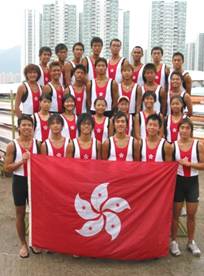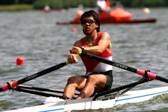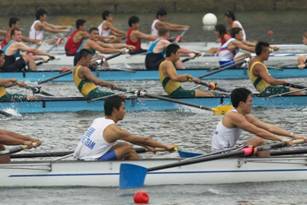ROWING - Guidelines to a Healthful Diet
Overview
International rowing events are held at 2000 meters and typically take 6 - 8 minutes to complete. Rowing competitions include lightweight and heavyweight categories. Crews are distinguished by the number of members in the boat (singles, doubles, fours, and eights). Most Hong Kong rowers are in the lightweight category. In the lightweight division, male athletes are not permitted to exceed 72.5 kg with a crew average of 70 kg. For female athletes, the maximum individual weight is 59 kg with a crew average of 57 kg. Rowing places great demands on the both aerobic and anaerobic energy systems and requires great power and strength.
Rowing training involves skill, power, and endurance. Even though the competition only lasts 6 – 8 minutes, rowers need to train 4 – 6 hours each day.
Rowing competition may last from few days to a week. Lightweight rowers must pass weigh-in two hours before competition.
Physical Characteristics
Rowers are muscular, tall and have long limbs. Lightweight rowers aim to keep low body fat level to maintain a good power-weight ratio.
Common Nutrition Issues
Rowers have very high energy and carbohydrate requirements to support training loads. Since rowers are required to train 2 – 3 sessions each day, recovery between sessions is crucial to maximize training gains. Rowers need to plan their training and eating schedules. The elite rowers of Hong Kong usually have a regular meal following each training session. The meal should be rich in carbohydrate, moderate in protein, and low fat in order to meet the requirement of recovery and weight control.
Common Concerns with Weight Control
Most rowers who need to control weight have the following concerns:
|
 |
Rowers will not encounter the above problems if they lose weight at a suitable rate (0.5 - 1 kg/week). However, if rowers have too little energy intake in order to make weight for competition, they will lose power and muscle. Therefore, rowers' diets should include carbohydrate-rich, moderate protein and low fat foods. Rowers should aim to consume 1.2 - 1.7g protein/kg body weight/day in order to preserve lean body mass. Rowers need to consume adequate amount of protein in conjunction with resistance exercise in order to promote muscle growth. Rowers who need to make weight should consume small frequent meals to avoid feeling hungry. They should also aim to lose body fat primarily and preserve lean body mass. Male rowers who need to make 72.5 kg should consume about 3000 kcal each day and female rowers who need to make 59 kg should consume about 2000 kcal each day. The following example is a dietary plan for weight-control:
|
Male Rower |
Female Rower |
|||
| Foods | Portion size | Foods | Portion size | |
| Breakfast | White bread | 2 slices (small) | White bread | 2 slices (small) |
| Fruit jam | 2 tsp | Fruit jam | 2 tsp | |
| Corn flakes | 30 g | Corn flakes | 30g | |
| Skimmed milk | 2 cups | Skimmed milk | 2 cups | |
| Lunch | Rice | 2 bowls | Rice | 2 bowls |
| Green vegetable | 1 bowl | Green vegetable | 1 bowl | |
| Fish | 4 oz | Fish | 2 oz | |
| Soymilk | 1 cup | Orange juice | 1 cup | |
| Banana | 1 item | Apple | 1 item | |
| Snack | White bread | 2 slices (small) | White bread | 1 slice (small) |
| Fruit jam | 2 tsp | Fruit jam | 1 tsp | |
| Orange | 1 item | Sport drinks | 1 cup | |
| Sport drinks | 1 cup | |||
| Dinner | Rice | 2 bowls | Rice | 1 bowl |
| Green vegetable | 100 g | Green vegetable | 100g | |
| Beef | 4 oz | Beef | 2 oz | |
| Orange | 1 item | Orange | 1 item | |
| Evening snack |
Banana | 1 item | Low fat yogurt | 1 cup (150g) |
| Ritz plain cracker | 5 pieces | Ritz plain cracker | 5 pieces | |
| Energy | 3074 kcal | 2110 kcal | ||
| Carbohydrate | 458 g (60%) | 333 g (63%) | ||
| Protein | 117 g (15%) | 77 g (15%) | ||
| Fat | 86 g (25%) | 52 g (22%) | ||
Pre-race Eating
Every lightweight rower must pass weigh-in before competition, otherwise he/she will be disqualified for the race. Once the rower passes the weigh-in, he/she should immediately replenish nutrition for the competition. The following procedures may be considered as race day preparation:
- Rowers should meet the target body weight as early as possible before competition. Rowers should not be still fighting to lose weight before competition.
- Rowers should measure body weight after waking up.
- Rowers can either eat or do some warm up exercises depending on the body weight. For example, jogging and then measure body weight.
- After weigh-in, rowers should consume:
- Carbohydrate/electrolyte drinks
- Easily digested and familiar foods. Avoid consuming unclean and unfamiliar foods on the race day
- Foods should be eaten within first hour after weigh in
The following foods or drinks are suitable for rowers to consume after weigh-in:
- 1 - 2 L of sport drink and other foods (provide 2g of carbohydrate per each kg body weight)
- Female rowers: 57kg x 2g/kgBW = 114g of carbohydrate (456kcal)
- Energy replacement drinks
- Pocari Sweat 1L → 60g of carbohydrate
- 2 scoops Polycal → 10g of carbohydrate
- 1 Powerbar→ 45 g of carbohydrate
- Energy replacement drinks
- Male rowers: 70kg x 2g/kgBW = 140g of carbohydrate (540kcal)
- Energy replacement drinks
- Procari Sweat 1L → 60g of carbohydrate
- 7 scoops Polycal → 35g of carbohydrate
- 1 Powerbar → 45 g of carbohydrate
- Energy replacement drinks
- Female rowers: 57kg x 2g/kgBW = 114g of carbohydrate (456kcal)
- Rowers may also consume sandwich or cereals
Eating During Competition
During competition, rowers should maintain adequate energy and fluid intakes and avoid overeating. In order to recover between sessions, rowers should consume foods that are rich in carbohydrate, moderate in protein, and low in fat.
Fluid Needs

Rowers need to train 2 – 3 sessions daily, therefore sweat losses can be high. Rowers should pay attention to fluid loss after exercise. Each kilogram of weight lost is the equivalent to 1L of fluid. To fully rehydrate, rowers should consume 150% of fluid loss over the next few hours in order to replenish fluid loss. For example, if a rower lost 1 kg after training session, the rower should consume 1.5L of fluid so that hydration level is good for the next training session.
Tips for Hydration
- Adequate fluid replenishment can improve performance. For example, drink 2 cups of fluid 2 hours before sleep and 2 cups of fluid upon awakening in the morning in order to prevent dehydration before training.
- Drink ½ cup of fluid 10 minutes before training.
- Drink ½ - 1 cup of fluid every 15 – 20 minutes during exercise.
- If a rower lost ½ kg (1 lb) after exercise, the rower should consume at least 2 cups of fluid. Drinks that contain carbohydrate and electrolytes are preferred since they can aid to replenish muscle glycogen and electrolytes lost in sweat.
- Bring sufficient fluid to training. Water bottles can be kept on the coach’s boat or the dock for top-ups.
- Sport drinks (eg. Pocari Sweat and Gatorade) are recommended during exercise
- Being at a fluid balance state during training and competition is important because it can maintain endurance and prevent muscle cramping. Therefore, do not dehydrate to make weight for competition. Dehydration also affects the quality of training.
A good dietary habit not only ensures health but also brings out your potential that paves the road to victory

The above information is provided by the Sport Nutrition Unit of the Athlete and Scientific Services Division. All information is for reference only.
Reproduction of materials is welcome with prior permission. Acknowledgements are required.
For enquiry, please contact:
Sports Science Department.
Tel: 2681 6277
Hong Kong Sports Institute
25 Yuen Wo Road,
Shatin, N.T., Hong Kong
Tel: (852) 2681 6888 Fax: (852) 2681 6330
Website: http://www.hksi.org.hk
 ID: hksportsinstitute
ID: hksportsinstitute

